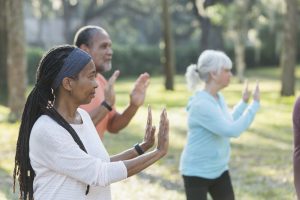Improve Cognitive Function in the Elderly with Tai Chi
By John M. de Castro, Ph.D.
“tai chi appears to improve executive function—the ability to multitask, manage time, and make decisions—in people without any cognitive decline. In those with mild cognitive impairment, tai chi slowed the progression to dementia more than other types of exercise and improved their cognitive function in a comparable fashion to other types of exercise or cognitive training.” – Harvard Health
The aging process involves a systematic progressive decline in every system in the body, the brain included. This includes our cognitive (mental) abilities which decline with age including impairments in memory, attention, and problem-solving ability. It is inevitable and cannot be avoided. Research has found that mindfulness practices reduce the deterioration of the brain that occurs with aging restraining the loss of neural tissue. Indeed, the brains of practitioners of meditation and yoga have been found to degenerate less with aging than non-practitioners. Tai Chi and Qigong have also been shown to be beneficial in slowing or delaying physical and mental decline with aging. The research findings have been accumulating. So, it makes sense to step back and summarize what has been learned about the effectiveness of Tai Chi for reducing cognitive decline during aging.
In today’s Research News article “Tai Chi is Effective in Delaying Cognitive Decline in Older Adults with Mild Cognitive Impairment: Evidence from a Systematic Review and Meta-Analysis.” (See summary below or view the full text of the study at: https://www.ncbi.nlm.nih.gov/pmc/articles/PMC7132349/), Yang and colleagues review, summarize, and perform a meta-analysis of the effects of Tai Chi practice on mental decline in the elderly. They identified 11 published research studies with a total of 1061 participants over the age of 60 with mild cognitive impairment.
They report that the published research found that Tai Chi practice produced a significant increase in global cognitive function including improved memory, learning ability, mental speed, attention, ideas, abstraction, creativity, mental flexibility, and visuospatial perception. In general, the effect sizes were modest, but they tended to signal a reversal of the decline. Hence, Tai Chi practice appears to improve the mental capabilities of the elderly with mild cognitive impairment. The studies included in the analysis did not have a comparison of Tai Chi practice to another form of exercise. So, it is possible that the benefits were produced, not by Tai Chi per se but by moderate exercise.
Tai Chi is an ancient mindfulness practice that involves slow prescribed movements. It is gentle and completely safe, can be used with the elderly and sickly, are inexpensive to administer, can be performed in groups or alone, at home or in a facility or even public park, and can be quickly learned. In addition, it can be practiced in social groups without professional supervision. This can make it fun, improving the likelihood of long-term engagement in the practice. This suggests that Tai Chi practice should be recommended for inclusion in the lifestyle of aging individuals.
So, improve cognitive function in the elderly with Tai Chi.
“Tai Chi has consistent, small effects on improving cognitive performance in both healthy older adults and older adults with some cognitive impairment.” – P. M. Wayne
CMCS – Center for Mindfulness and Contemplative Studies
This and other Contemplative Studies posts are also available on Google+ https://plus.google.com/106784388191201299496/posts and on Twitter @MindfulResearch
Study Summary
Yang, J., Zhang, L., Tang, Q., Wang, F., Li, Y., Peng, H., & Wang, S. (2020). Tai Chi is Effective in Delaying Cognitive Decline in Older Adults with Mild Cognitive Impairment: Evidence from a Systematic Review and Meta-Analysis. Evidence-based complementary and alternative medicine : eCAM, 2020, 3620534. https://doi.org/10.1155/2020/3620534
Abstract
To determine whether Tai Chi (TC) is effective in slowing cognitive decline in older populations with mild cognitive impairment (MCI), we performed a systematic review and meta-analysis of randomized controlled trials (RCTs) on Tai Chi and MCI. We searched eight electronic databases (PubMed, PsycINFO, Wanfang, Web of Science, MEDLINE, CNKI, EBSCO, and the Cochrane Central Register of Controlled Trials) for appropriate RCTs published up to August 2019. For those studies included, the data were extracted, methodological quality was evaluated, and then meta-analysis was performed using Review Manager software (version 5.3). A total of 11 of the studies were available for systematic review, which together included 1061 participants, met the inclusion criteria, and ten of these were included in the meta-analysis. For most RCTs, the methodological quality was moderate. The meta-analysis revealed that Tai Chi could significantly improve global cognitive function; memory and learning; mental speed and attention; ideas, abstraction, figural creations, and mental flexibility; and visuospatial perception. The present review adds to the evidence showing that Tai Chi is potentially beneficial in improving cognitive functions among elderly people with MCI. However, strictly designed and well-reported RCTs are required.
https://www.ncbi.nlm.nih.gov/pmc/articles/PMC7132349/
